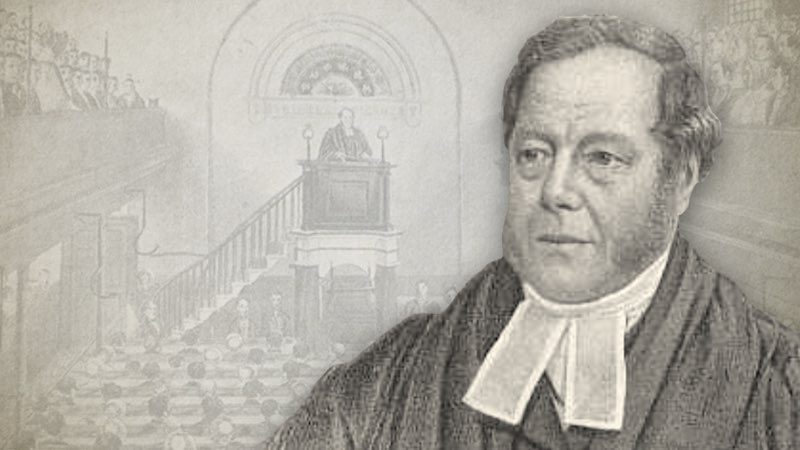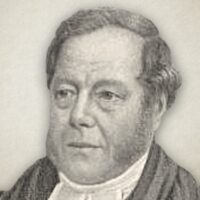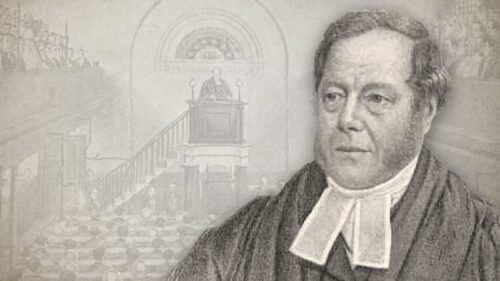
Letter 1: To Silas—On The Trinity
My dear Silas,
I take up my pen to invite your attention to a subject the most exalted and sublime in its nature, and the most important in its relation to the whole scheme of Redemption. The doctrine of a Trinity of Persons in the Godhead is so closely interwoven with every part of the sacred volume, and feature of Christian experience, that every new creature in Christ Jesus might be expected to admit, although he cannot comprehend it. Indeed if we determine to admit no more than we can comprehend we shall soon find ourselves on the high road to Atheism, but allowing Jehovah’s testimony of himself to be true, and attending to its influence in every Christian’s heart, we shall flee firom the regions of scepticism, and take up our abode in the pure air of gospel truth. The whole testimony of scripture from Genesis to Revelation maintains this doctrine. In the first of Genesis we have this striking phrase, “Let us make man,” and in the last of Revelation we have a description of the throne of God and the Lamb which corroborates the same truth: yea, the whole of the sacred pages form one grand epitome of the covenant engagement and work of the triune God, making known the sovereign love of God the Father—the voluntary suretyship of God the Son and the efficacious grace of God the Spirit.
But “He that believeth,” saith an inspired apostle, “hath the witness in himself,” and I need only refer you, my dear Silas, to your own experience for a satisfactory evidence of the fundamental doctrine which is the subject of this letter.
When first your eyes were opened to spiritual things, and your ruin by sin was discovered, was not the idea of approaching Deity terrific to your mind? Did you not feel conscious that you must obtain pardon at his hands, or perish forever? And yet were you not afraid to draw nigh to him for it, lest his vengeance should consume you? And could you ever look up to heaven with confidence until you discerned the way of access through the person of Christ? Then, like the Holy Psalmist, you exclaimed, “behold, O God our Shield, and look upon the face of thine Anointed.” Assured from God’s own word, that all men are required to honor the Son even as they honor the Father, you felt encouraged to adore him as “over all God blessed for ever,” trusting your eternal all in his hands, believing his personal and official declaration, “no man can come to the Father but by me.”
Take a retrospective View, my dear young friend, of those sacred moments of delightful emotion when Jesus first manifested himself to you as the sinner’s friend and surety,“mighty to save,” having all the fulness of the Godhead treasured up in himself, yet, proving his distinct personality by being sent forth from the Father; and ascending again to the Father; stooping to earth to rescue you from hell, and ascending to heaven to prepare you a mansion, and to Secure your entrance into it. Have you not trusted your soul with all its vast concerns in his hands, under the sweet assurance that he is able to keep that which you have committed to him against that day? And upon what can that assurance be founded, but his eternal power and Godhead?
The guilty, and helpless, and curs’d,
By nature a rebel and slave;
In Jesus your God you can trust,
Because he is “mighty to save.”
Precious Jesus! how thy glories, personal and official, delight the souls of thy ransomed family, and call forth their best affections, their strongest confidence, and their highest adoration. But no man can call Jesus Lord but by the Holy Ghost, whose express office it is to testify of Jesus; and my dear Silas will at once perceive that the office of the Holy Ghost proves his personality and his Godhead. You had never known your guilt and ruin, so as to mourn over it and escape from it, but for his divine teaching; you had never melted in contrition before God, but for his mighty operation upon your heart; you had never seen any beauty in Jesus, but for his heavenly illumination; nor would you ever have hated sin and loved holiness, but for his transforming power. What power but omnipotence could effect what has been effected, in your soul? Once you were darkness, but now are you light in the Lord—Once you were enmity itself against God, but now, love to God is the reigning principle in your breast—once you were dead in sin, but now you are alive to God through Jesus Christ: and how was all this effected? “Not by might nor by power, but by my Spirit saith the Lord.” Thus you have the witness in yourself, as a believer, that the Spirit is Jehovah, or he could not have wrought such a work in you—that the Redeemer is Jehovah, or he could not have been your Saviour—that as God-man he is your Mediator and without a Mediator you dare not approach an offended God.
Moreover, your daily communion with heaven confirms this glorious doctrine: you do not always find yourself in a devotional frame of mind, when the seasons of retirement return. No, you have often found it difficult, yea, impossible to glance a thought half way to God; and even while you have used the language of prayer, your heart has been full of unbelief, or wandering like the fool’s eye to the ends of the earth; but when the Spirit has helped your infirmities, and, made intercession for, you, with what holy fervour have you wrestled with God—with what sacred delight have you communed with the Father—with what strong confidence have you relied on the merits and intercession of the Son—and what a rich supply have you obtained of the comforts of the Holy Ghost! Then how contemptible did all terrene objects appear, and how precious did Jesus become to your soul, “through whom you found access by one Spirit to the Father,” “and rejoiced in hope of the glory of God? Then you knew what is meant by “praying in the Holy Ghost.” Take encouragement, my dear Silas, from these things, to look for greater discoveries of the divine persons and perfections of the Godhead to your soul.
It is promised that “when he, the Spirit of truth is come, he will guide you into all truth and Christ’s declaration of himself, is, “I am the truth;” it becomes, therefore, the express office of the Holy Ghost to lead our minds into the fulness of Christ, and through him up to the covenant love of God the Father; so that under his immediate influence we exclaim, “truly our fellowship is with the Father, and with his Son Jesus Christ.”
The Father sheds his love abroad in our hearts by the power of the Holy Ghost—the Son manifests himself to us as he does not to the world, by the discoveries of the Holy Ghost—and the Holy Ghost himself bears witness with our spirits, that we are the children of God: here are personal acts performed in the believer’s experience by each of the persons of the Deity. Can any man, who is the recipient of these divine favours, want further evidence of the doctrine which they establish? If more were necessary to be said, I might advert to the promises of God, and shew you, that though they are spoken by God the Father, and are said to be, yea and amen in Christ Jesus, yet you never enjoy their preciousness, but as they are applied to your heart by the power of the Holy Ghost.
Again, the blessings of the gospel are all covenant blessings, and as the gifts of God the Father, they are received by God the Son as our covenant head, who is said to have received gifts for men; and of God the Holy Ghost, Christ says, “he shall receive of mine and shall shew it unto you.” Moreover, the distinct offices and relations which the triune Jehovah sustains, are further confirmations of this important doctrine, which will find an echo in your experience. The filial affection with which you have approached Jehovah as your Father—the paternal kindness which you have received at his hands,—yea, the very corrections with which he has visited you, are proofs of his eternal love to you. The vital union formed by faith between your soul and Christ, as your elder brother, (who is not ashamed to call his people brethren,) the sweet correspondence you hold with him in this endearing relation, and the soul reviving communion, you have been enabled to keep up with him, as your brother, forbid your calling in question either his personality, or his eternal power and Godhead. And, the unction of the Holy One resting upon you, in his quickening, comforting, and illuminating influences are standing and experimental proofs, that “there are three that bear record in Heaven, the Father, the Word, and the Holy Ghost, and these three are one.” That you, my dear Silas, may live in the enjoyment of the Father’s everlasting love, upon the fulness of grace treasured up in the Son, and under the special influence of the Holy Ghost,
Joseph Irons
Is the Prayer of yours, &c. in the Lord,
Almighty Father, own me as thy child,
And bid me own thee with a filial cry.
In thee Jehovah Jesus, I confide,
The Father’s equal—and the sinner’s friend.
And thee eternal Spirit I adore,
My sanctifier, comforter and guide.
A triune God, distinct in persons, yet
In essence, ONE INCOMPREHENSIBLE!!
Joseph Irons (1785-1852) was an Independent sovereign grace preacher, author and hymn writer. In 1819, he was appointed the minister of Grove Chapel, Camberwell, a position he held until his death thirty-three years later. John Hazelton wrote of him:
“Joseph Irons (1785-1852) was one of the ablest preachers of his day, and a powerful and prolific writer. His doctrinal teaching was pellucidly clear and consistent; he was a profound student and sound expositor of the Word of God, and many were influenced by his sermons, spoken and printed, and confirmed in the faith of God's elect. He was a determined foe of Romanism and Ritualism, deeply interested in the welfare of the young, and ready to aid any effort that commended itself to him on the basis of the faith for which he so earnestly contended. Many of his hymns have secured a permanent place in our hymnology, and his sermons are doctrinal, experimental, and practical in the best sense of the words. He never ceased to preach Christ, making Him the Alpha and Omega of all his discourses. He was born at Ware, in Hertfordshire, and brought up under the care and counsel of a godly father, who was a builder, and who trained his son in that trade. When he left his father's roof, he tells us the parting words were, "There's poor Joseph going to that wicked London. My heart bleeds while I bid him goodbye. I fear it will end in his ruin. You will be far away from a father's eye and a father's counsel, but never will I cease to pray for you that God may preserve and prosper you, although surrounded with so much that is evil." The youth was but eighteen when, in 1803, God led him to the Church of St. Mary Somerset, Thames Street, to hear W. Alphonsus Gunn, and there the arrow was directed into his conscience and he was brought to a saving knowledge of Divine truth. In 1808 his first sermon was preached over a smith's shop at Dulwich; he was actively engaged in business, but on most Sundays would walk from ten to twenty miles, preaching in various villages. "My only companions were my pocket Bible and its Divine Author, who often favoured me with the spirit of prayer on the way and shed many a ray of Divine light on the inspired page, so that I was furnished with a 'Thus saith the Lord.'"
After six years' service in Hertfordshire, he became pastor of the Church at Sawston, near Cambridge, and in January, 1818, he preached his first sermon in Camberwell. Ultimately, Grove Chapel was erected and opened on July 20th, 1819, and within its walls until the time of his death he continued proclaiming the Gospel; his mortal remains rest in a vault under the pulpit. In his last sermon, about ten days before his decease, he spoke of heaven in joyful terms: "I confess that my soul longs for it, and I anticipate meeting with prophets and apostles and patriarchs, and above all, with Jesus Himself, to behold Him face to face in glory, to be like Him, and to see Him as He is."
His published writings were numerous, some running into many editions. "Jazer," letters on Gospel doctrine; "Nathaniel," letters on Christian experience; "Nymphas," an exposition of the Song of Solomon; 611 original hymns; and a paraphrase of the Book of Psalms, are among the number. He established a Home Mission and other Societies for visiting and assisting the sick poor, and to the end of his life he was one of the best friends and helpers of the Aged Pilgrims' Friend Society. This great man was no idler in the Lord's vineyard. He talked not about "working for Christ," but delighted to magnify his glorious Lord. His sermons should be models for our preachers to-day in their perspicuity, plainness and power. He could not cut and trim to the times. His faithfulness gave offence to many whose creed and conduct could not bear the blaze of truth and the pointed appeals he made to conscience. Many hard speeches were made against him, but he remained unmoved as an iron pillar. As a man he had very tender feeling and often smarted under the unkind treatment of those of whom better things might have been hoped; but neither the fawning of one party nor the frowns of the other could shake his firmness. When at home in his "Shepherd's Tent," Grove Lane, he used very frequently to visit his chapel; to him it was a peaceful, private promenade, after the close confinement of his study, in which he spent many hours every day. Covenant love, covenant blood and covenant grace were his constant theme. His dying desire, so graciously fulfilled, was that Grove Chapel "might never be desecrated with another gospel." Someone told him that he put too much in his sermons and should reserve ideas for future use. He replied, "Thank God I obtain my materials from heaven; my Master knows what things I have need of, and having called me, He will not allow me to work alone. I get my sermons on my knees with the Word of God before my eyes and if I empty my seed-basket to-day, I know He will fill it to-morrow; therefore I will, God helping me, tell it all out, or it would be like a fire in my bones, burning its way out." Grove Chapel recalls many memories of those who have gone before; in its schoolroom is a unique collection of portraits of free grace ministers of various sections of the one Church. In No. 5 pew in the Chapel is the spot where the Lord first met with the "Wayside Notes" writer, broke him down in contrition of heart and revealed Christ to him as all his salvation, and there are friends still with us who can testify to the power of Mr. Irons' ministry, when in their early years they sat under it.”




